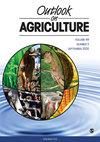Assessing German farmers’ trade-offs between disease resistance and yield in winter wheat varieties
IF 2.6
3区 经济学
Q1 AGRICULTURE, MULTIDISCIPLINARY
引用次数: 1
Abstract
Disease resistant crop varieties are important for both disease control and for reducing chemical pesticide use. However, there is often a trade-off between disease resistance and yield. While the European Union has banned the use of some pesticides in agriculture, large amounts are still applied to various crops, including wheat. Market-based instruments could motivate farmers to adopt more environmentally friendly production methods. In this study we aimed to explore farmers’ adoption of resistant varieties in different wheat price scenarios and their willingness to forgo yield when cultivating more resistant varieties. We conducted face-to-face interviews with 192 farmers using a choice experiment. Results showed that farmers preferred traits of yield stability (fungal disease resistance, lodging resistance and drought tolerance) over yield. Preferences for traits varied with the production system; livestock production was negatively associated with the importance of yield; cultivated land area was positively associated with protein content. The market price scenario did not change preferences. We calculate that farmers are willing to forgo more yield by cultivating highly disease resistant varieties than they are likely to recuperate from reducing costs of pesticides. Overall, we conclude that farmers’ choices are based more on a combination of the production system, drought experience, climate change belief and the potential impact of further regulations to reduce the use of chemical pesticides than on the expected wheat price.评估德国农民在冬小麦品种的抗病性和产量之间的权衡
抗病作物品种对疾病控制和减少化学农药的使用都很重要。然而,在抗病性和产量之间往往存在权衡。虽然欧盟已经禁止在农业中使用某些农药,但仍有大量农药被用于包括小麦在内的各种作物。基于市场的工具可以激励农民采用更环保的生产方法。在本研究中,我们旨在探讨农民在不同小麦价格情景下对抗性品种的采用情况,以及他们在种植抗性更强的品种时放弃产量的意愿。我们通过选择实验对192名农民进行了面对面的访谈。结果表明,相对于产量,农民更看重产量稳定性(抗真菌病、抗倒伏和耐旱性)。对性状的偏好随生产系统的不同而不同;畜牧生产与产量的重要性呈负相关;耕地面积与蛋白质含量呈正相关。市场价格情景并没有改变偏好。我们计算出,农民愿意放弃更高的产量,种植高度抗病的品种,而不是从减少农药成本中恢复过来。总体而言,我们得出结论,农民的选择更多地是基于生产系统、干旱经验、气候变化信念以及进一步减少化学农药使用的法规的潜在影响的综合因素,而不是预期小麦价格。
本文章由计算机程序翻译,如有差异,请以英文原文为准。
求助全文
约1分钟内获得全文
求助全文
来源期刊

Outlook on Agriculture
农林科学-农业综合
CiteScore
5.60
自引率
13.30%
发文量
38
审稿时长
>36 weeks
期刊介绍:
Outlook on Agriculture is a peer reviewed journal, published quarterly, which welcomes original research papers, research notes, invited reviews and commentary for an international and interdisciplinary readership. Special attention is paid to agricultural policy, international trade in the agricultural sector, strategic developments in food production, the links between agricultural systems and food security, the role of agriculture in social and economic development, agriculture in developing countries and environmental issues, including natural resources for agriculture and climate impacts.
 求助内容:
求助内容: 应助结果提醒方式:
应助结果提醒方式:


